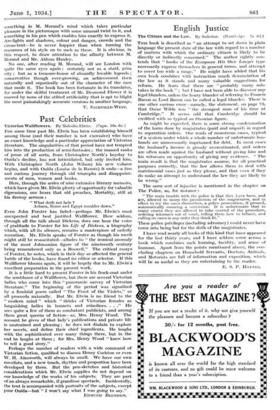English Justice
The Citizen and the Law. By Solicitor. (Routledge. 7s. 6d.)
Tins book is described as " an attempt to set down in plain - language the present state of the law with regard to a number . of matters with which the ordinary citizen is likely to be directly or indirectly concerned." The author rightly con-, tends that " books of the Everyman His Own Lawyer type necessarily express themselves in general terns, and attempt to cover too wide a range." He might have added that his own book combines with instruction much denunciation of the law as it stands and many valuable suggestions for reform. He fears that there are " probably many mis- takes in the book " ; but I have not been able to discover any legal blunders, unless the hoary blunder of referring to Francis Bacon as Lord Bacon can be called a legal blunder. There is one other curious error—namely, the statement, on page 73, that Oscar Wilde was " the strongest man of his time at Cambridge." It seems odd that Cambridge should be credited with so typical an Oxonian figure.
As might be expected, there is some strong condemnation of the harm done by magistrates (paid and unpaid) in regard to separation orders. One reads of monstrous cases, typical of a system under which a whole number of unfortunate hus- bands are unnecessarily imprisoned for debt. In most cases the husband's income is grossly overestimated, and orders are often made against the husband without giving him and his witnesses an opportunity of giving any evidence. " The main result is that the magistrates assume, for all practical purposes correctly, that the law allows them to deal with matrimonial cases just as they please, and that even if they do make an attempt to understand the law they arc likely to be wrong."
The same sort of injustice is mentioned in the chapter on The Police, as, for instance :
" The main trouble with the police is that they have been, and are, allowed to usurp the jurisdiction of the magistrates, and in effect to try the cases themselves, a police prosecution, if pressed, automatically ensuring a conviction. It is unfortunate that in many courts they are allowed to take control of the procedure, ordering witnesses out of court, telling them how to behave, and calling on cases in any order they think fit."
These police privileges (including advocacy) could never have come into being but for the sloth of the magistrates.
I have read nearly all books of this kind that have appeared for the last thirty years, and I have seldom come across a book which combines such learning, lucidity, and sense of humour. Apart from the points mentioned above, the con- cluding chapters on Household Servants, Doctors, Animals, and Motorists are full of information and exposition, which will be as useful as they are entertaining to the reader.
E. S. P. HAvis-Es.




































 Previous page
Previous page